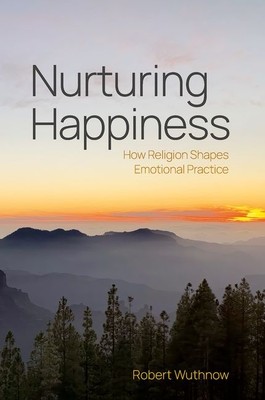
- We will send in 10–14 business days.
- Author: Robert Wuthnow
- Publisher: Oxford University Press
- ISBN-10: 0197807046
- ISBN-13: 9780197807040
- Format: 15.6 x 23.2 x 1.6 cm, minkšti viršeliai
- Language: English
- SAVE -10% with code: EXTRA
Reviews
Description
How does religious faith contribute to happiness? The usual answer is that religious belief relieves the anxieties of ordinary life and that religious belonging provides emotional support. But a growing body of literature suggests that happiness is more complicated than that. Happiness is not only a feeling. It is a practice that we engage in actively, that we attempt to manage, and that is in many ways managed for us -- by social norms and institutions.
In Nurturing Happiness, Robert Wuthnow develops the concept of emotional practice and locates it in the sociological literature on practice theory. He describes how American faith leaders at pivotal moments in their history attempted to nurture -- and control -- their adherents' thoughts about happiness and their experiences of it. He shows how religious authorities used their discursive power to draw moral distinctions among kinds of happiness and their institutional power to manage where it took place and how it was expressed. And he demonstrates that religious authorities' efforts to nurture happiness, while not always effective, played a crucial role in faith communities' adaptation to changing social conditions.
This book describes these adaptations in colonial-era arguments about heavenly joy and virtuous living, nineteenth-century revival meetings and festive events, Progressive-era advocacy for useful service, recent efforts to link play with transcendence and to associate joyful spirituality with personal discipline, and current responses to the fallout from illicit pursuits of happiness. Nurturing Happiness is required reading for anyone interested in understanding how religious faith relates to happiness.
EXTRA 10 % discount with code: EXTRA
The promotion ends in 22d.14:02:21
The discount code is valid when purchasing from 10 €. Discounts do not stack.
- Author: Robert Wuthnow
- Publisher: Oxford University Press
- ISBN-10: 0197807046
- ISBN-13: 9780197807040
- Format: 15.6 x 23.2 x 1.6 cm, minkšti viršeliai
- Language: English English
How does religious faith contribute to happiness? The usual answer is that religious belief relieves the anxieties of ordinary life and that religious belonging provides emotional support. But a growing body of literature suggests that happiness is more complicated than that. Happiness is not only a feeling. It is a practice that we engage in actively, that we attempt to manage, and that is in many ways managed for us -- by social norms and institutions.
In Nurturing Happiness, Robert Wuthnow develops the concept of emotional practice and locates it in the sociological literature on practice theory. He describes how American faith leaders at pivotal moments in their history attempted to nurture -- and control -- their adherents' thoughts about happiness and their experiences of it. He shows how religious authorities used their discursive power to draw moral distinctions among kinds of happiness and their institutional power to manage where it took place and how it was expressed. And he demonstrates that religious authorities' efforts to nurture happiness, while not always effective, played a crucial role in faith communities' adaptation to changing social conditions.
This book describes these adaptations in colonial-era arguments about heavenly joy and virtuous living, nineteenth-century revival meetings and festive events, Progressive-era advocacy for useful service, recent efforts to link play with transcendence and to associate joyful spirituality with personal discipline, and current responses to the fallout from illicit pursuits of happiness. Nurturing Happiness is required reading for anyone interested in understanding how religious faith relates to happiness.


Reviews